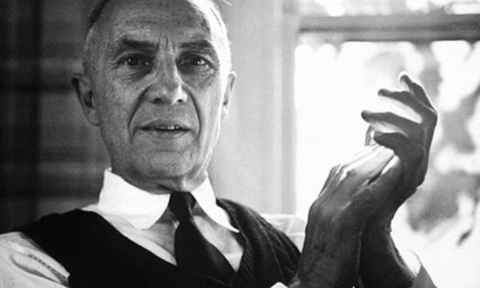Like the idea of totalitarianism, perhaps best articulated by Hannah Arendt in her post-war Origins of Totalitarianism, George Orwell’s post-war scrutiny of repressive governments has become a staple, catch-all reference for pundits on either side of the political spectrum, particularly the concepts of doublespeak, doublethink, historical revisionism, and the hyper-intrusive Big Brother, all from the 1949 novel 1984. In fact, few adjectives seem to get deployed with more frequency in urgent political discourse of all kinds than “Orwellian.” But the name George Orwell, pen name of journalist Eric Blair, hides an enigma: Orwell identified himself explicitly as a Democratic Socialist of a particularly English bent (most notably in his essay “The Lion and the Unicorn”), but his scathing critiques of nearly every existing institution sometimes make it hard to pin him down as a partisan of anything but the kind of freedom and openness that everyone vaguely wants to advocate. That ambiguity is a strength; despite his steadfast leftist roots, Orwell would not be a partisan hack—where he saw stupidity, avarice, and brutal inhumanity, he called it out, no matter the source.
The seeming contradictions and ironies that permeate Orwell’s thought and fiction are also what keep his work perennially interesting and worth rereading and revisiting. He was a probing and unsentimental critic of the motives of propagandists of all stripes, both left and right. Beginning in late January, BBC Radio 4 launched a month-long series on Orwell, with the avowedly ironic name, “The Real George Orwell.” Part of the irony comes from the fact that Orwell (or Blair) once worked as a propagandist for the BBC during WWII, and later based the torture area in 1984, Room 101, on a meeting room he recalled from his time there. His experiences with the state broadcasting network were not pleasant in his memory. Nonetheless, his former employer honors him this month with an extensive retrospective, including readings and dramatizations of his essays and journalism, his semi-autobiographical accounts Down and Out in Paris and London and Homage to Catalonia, and his novels Animal Farm and 1984.
In this latest dramatization of Orwell’s most famous novel, protagonist Winston Smith is voiced by actor Christopher Eccleston, who has inhabited another key post-war character in English fiction, Dr. Who (Pippa Nixon voices Julia). In a brief discussion of what he takes away from the novel, Eccleston (above) draws out some of the reasons that 1984 appeals to so many people who might agree on almost nothing else. At the heart of the novel is the kind of humanist individualism that Orwell never abandoned and that he championed against Soviet-style state communism and hard-right imperialist authoritarianism both. Winston Smith is an embodiment of human dignity, celebrated for his struggle to “love, remember, and enjoy life,” as Eccleston says. “It’s the human story that means that we keep coming back to it and that keeps it relevant.” Listen to a brief clip of the 1984 dramatization at the top of this post, and visit BBC Radio 4’s site to hear parts one and two of the full broadcast, which is available online for the next year. When Europe and America both seem rent in two by competing and incompatible social and political visions, it’s at least some comfort to know that no one wants to live in the world Orwell foresaw. Despite his novel’s deeply pessimistic ending, Orwell’s own career of fierce resistance to oppressive regimes offers a model for action against the dystopian future he imagined.
For other free, online readings of Orwell’s work, you can visit our archives of Free Audio Books, where you’ll find
- 1984 – Free MP3 Zip File – Multiple Versions
- Free eBook available here.
- Animal Farm – Free MP3 Zip File – Free iTunes
- Free eBook available here.
- Homage to Catalonia – Chapter 1 here – Remaining Chapters here
Related Content:
Aldous Huxley Reads Dramatized Version of Brave New World
Free: Isaac Asimov’s Epic Foundation Trilogy Dramatized in Classic Audio
Also find major works by Orwell in our collection of Free eBooks
Josh Jones is a writer, editor, and musician based in Washington, DC. Follow him @jdmagness


